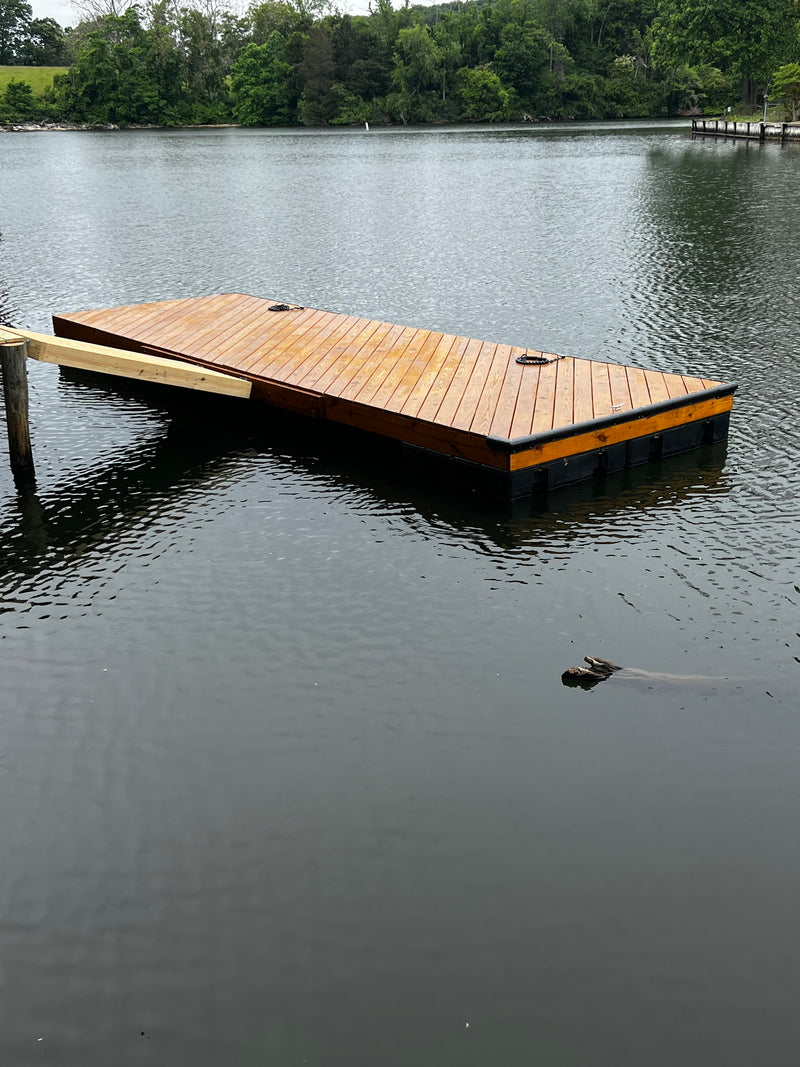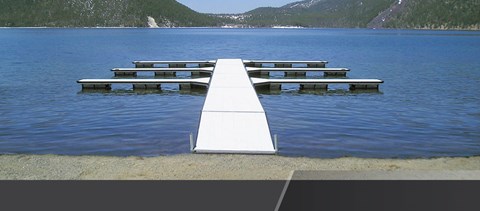Why Floating Docks Are the Perfect Solution for Your Beachfront Demands
Floating docks existing a compelling remedy for beachfront needs, specifically due to their flexibility to varying water levels and their durable, modular style. These structures not only boost functionality for both entertainment and commercial functions yet likewise supply personalization choices customized to specific requirements. Their ecologically pleasant products add to sustainability efforts. As we discover the complex advantages and applications of floating docks, it ends up being obvious why they attract attention in the realm of waterfront infrastructure-- particularly when taking into consideration the long-lasting advantages they attend to various stakeholders.
Key Benefits of Floating Docks
The flexibility of floating docks offers many advantages for waterfront applications, making them a progressively preferred choice among marina drivers and building developers. One of the key benefits is their versatility to fluctuating water levels, which allows them to remain functional in numerous environments, consisting of lakes, rivers, and coastal areas. Unlike standard fixed docks, floating docks can rise and drop with the tides and seasonal changes, ensuring constant ease of access.
Furthermore, floating docks are commonly simpler and more economical to keep and mount. Their modular layout promotes fast assembly, reducing labor prices and building and construction time. The materials made use of in floating dock building are often immune to corrosion, making certain durability with very little maintenance.
Security is another essential advantage; the buoyant nature of these docks lessens the danger of accidents during boarding and getting off, making them especially appealing for family-oriented facilities. Their ecological effect is lower than that of fixed structures, as they do not interrupt marine environments. Jointly, these benefits placement floating docks as a superior option for a variety of waterside requirements, straightening with both operational effectiveness and environmental factors to consider.
Ideal Applications for Different Tasks
Adaptability is a characteristic of floating docks, making them appropriate for a wide range of activities throughout various beachfront settings. These flexible frameworks can serve as optimal platforms for recreational tasks such as boating, angling, and swimming. Their buoyant nature permits very easy accessibility to watercraft, making it possible for smooth departure and disembarkation, while also supplying a secure location for anglers to cast their lines.
In industrial settings, floating docks promote the loading and discharging of products, suiting both huge and tiny vessels. They are specifically beneficial in locations with rising and falling water levels, ensuring that procedures remain uninterrupted. Furthermore, floating docks can be made use of for waterfront dining and entertainment, offering a unique and picturesque experience for clients.
Environmental applications are additionally notable; floating docks can function as observation platforms for wild animals seeing or as docking terminals for research vessels taken part in ecological studies. As marina growths come to be a lot more prevalent, these docks supply a useful option for boosting capacity without considerable land alterations. Ultimately, the versatility of floating docks makes them a preferred option for any individual seeking effective and practical waterside services.
Style and Modification Alternatives
Floating docks not just cater to diverse tasks yet likewise supply a range of style and personalization options that enhance their functionality and visual appeal. These flexible structures can be customized to fit details beachfront demands, whether for property, business, or recreational purposes.
One key facet of modification is the selection of materials. Choices range from high-density polyethylene to aluminum, each supplying special advantages in terms of longevity and maintenance. Furthermore, the setup of the dock can be adapted to match various water degrees and ecological conditions, making sure stability and security.
Layout functions can include integrated seats, barriers, and lighting, which not just boost functionality yet likewise improve the appearance of the dock. Customized surfaces and colors permit owners to match the dock with existing structures or personal preferences, producing a natural seek the waterside.
In addition, floating docks can be developed with modular areas, allowing very easy growth or reconfiguration as demands alter. This flexibility is particularly valuable for expanding households or advancing business. Generally, the comprehensive design and customization choices offered make floating docks a very adaptable remedy for any waterside setting.
Setup and Upkeep Factors To Consider
Normally, successful setup and maintenance of floating docks call for careful planning and focus to detail. Prior to beginning installment, it is vital to examine the certain website problems, including water depth, wave action, and regional regulations. This first assessment notifies the choice of materials and design, guaranteeing the dock will endure environmental stresses.

Maintenance is equally crucial to prolong the life expectancy of the dock. Normal evaluations need to be conducted to determine deterioration, specifically on flotation protection devices, ports, and decking. Cleansing the dock regularly helps prevent the buildup of algae and particles, which can compromise surface area stability and appearances.
Furthermore, seasonal prep work, such as getting rid of accessories and protecting the dock throughout extreme climate, can avoid damages. By prioritizing correct setup and regular maintenance, proprietors can ensure their floating dock continues to be a practical and reputable waterside remedy for several years to come.

Environmental Influence and Sustainability
The environmental impact of floating docks is an important consideration for waterside tasks, as these structures interact directly with water communities. floating docks. Unlike conventional set docks, floating docks minimize disturbance to the substratum, permitting all-natural sediment activity and minimizing erosion. Their design enables water flow under, promoting healthy and balanced marine settings and supporting regional wild animals
Many floating docks are constructed from sustainable materials, such as green compounds and recycled plastics, which decrease the carbon footprint connected with production. Modern-day designs include functions that improve ecological sustainability, such as absorptive surface areas that promote water filtering and reduce air pollution.
Floating docks additionally supply a perfect system for habitat remediation by sustaining the development of marine greenery and offering shelter for fish and various other aquatic microorganisms. By consisting of attributes like fish habitats and immersed plantings, floating docks can improve biodiversity in the location.
Additionally, these structures can be developed to suit photovoltaic panels, supplying go to this site renewable resource options that even more minimize their environmental impact (floating dock builder). Generally, floating docks represent a lasting remedy that stabilizes human use of watersides with the preservation of essential ecosystems
Verdict
Finally, floating docks present a extremely adaptable and lasting solution for diverse waterfront demands. Their modular design, combined with making use of long lasting, corrosion-resistant products, makes certain long life and simplicity of maintenance. The flexibility of floating docks suits various applications, ranging from leisure tasks to commercial operations while minimizing ecological impact. Inevitably, the adjustable attributes and ability for growth more solidify floating docks as an ideal selection for any kind of beachfront task.
Floating docks present an engaging solution for beachfront demands, particularly due to their adaptability to varying water degrees and their durable, modular layout. Unlike conventional set docks, floating docks can climb and fall with the trends and seasonal changes, ensuring regular ease of access.
Jointly, these advantages setting floating docks as navigate to this site an exceptional option for a range of waterside needs, lining up with both functional effectiveness and eco-friendly considerations.
Overall, the considerable design and personalization choices available make floating docks a highly versatile option for any type of waterside setting.
Unlike conventional set docks, floating docks minimize disturbance to the substratum, permitting for natural debris activity and minimizing disintegration.
Comments on “How to Select the Right Floating Dock Builder for Your Customized Dock Needs”